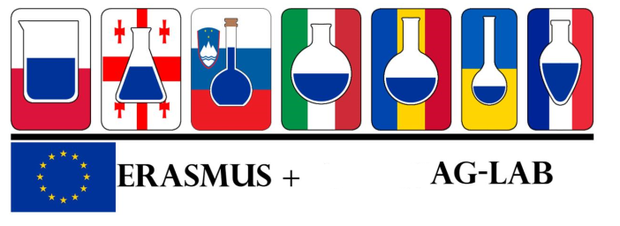Project “Improving skills in laboratory practice for agri-food specialists in eastern Europe» (Ag-Lab)
Program Erasmus+ KA2 586383-EPP-1-2017-1-SI-EPPKA2-CBHE-JP (2017-2978/001-001)
Training report
Place: Wroclaw University of Environmental and Life Sciences, ul. Norwida 25, 50-375, Wroclaw, Poland
Dates: 20-26 May, 2021
Vovkotrub Nataliia, Ass. Prof. of the Department of Therapy and Clinical Diagnostics, PhD in Veterinary Sciences, Bila Tserkva National Agrarian University (Bila Tserkva, Ukraine)
20.06.2021 (Sunday)
Arrival
21.06.2021 (Monday): Official meeting with Faculty’s authorities. Faculty tour.
The Wroclaw Faculty of Veterinary Medicine, as an inheritor of the scientific achievements and traditions of the Lviv Academy of Veterinary Medicine, launched its activity on the 1 November 1945 as a department of the established from scratch University and Polytechnic of Wroclaw. Presently, it is one of the five faculties which form the structure of the University of Environmental and Life Sciences. For almost 67 years, thanks to the commitment of the Faculty Employees, there has been created the approved and valued research and educational centre, being entitled to confer the following scientific degrees: PhDs and Higher Doctorates in veterinary science. Currently, scientific and didactic staff constitutes more than 100 approved specialists in various disciplines of veterinary medicine. In May 2016 the Faculty received official EAEVE certificate of approval, in accordance with EAEVE standards and based on the educational requirements of the EAEVE Organization. The Faculty includes 10 Departments: Department of Biostructure and Animal Physiology, Department of Biochemistry and Molecular Biology, Department of Pharmacology and Toxicology, Department of Immunology, Pathophysiology and Veterinary Preventive Medicine, Department of Pathology, Department of Internal Medicine and Clinic of Diseases of Horses, Dogs and Cats, Department of Epizootology and Clinic of Bird and Exotic Animals, Department of Reproduction and Clinic of Farm Animals, Department of Surgery, Department of Food Hygiene and Consumer Health Protection and Center of Computer Lab. Faculty provides specialistic study for graduated veterinarians leading to diploma of specialist. An important issue is to make graduates able to get into the profession of public trust with fully acquired “day one skills”.
In the afternoon, according to the internship program, I and other participants visited the Department of Food Hygiene and Consumer Health Protection to undergo practical training on DNA isolation from the meat products to identify the origin of meat according to the species of animals using PCR under the guidance of Dr. Aleksandra Tabis. At the same time, we got acquainted with the organization of laboratories at the Division of Raw Animal Materials Hygiene and Division of Food Microbiology and Processing Hygiene, their equipment and algorithms of staff work.
22.06.2021 (Tuesday): Bird breeding and behavior with Joanna Rosenberger, PhD, Institute of Animal Breeding.
This day I have had the lecture by Prof. Joanna Rosenberger on the topic “Capercaillie. What we do to prevent them from vanishing from our forests” with emphasis on breeding wild birds threatened with extinction. After that I studied the equipment of Institute of Animal Breeding (incubators, devices for analyzing egg quality and embryo viability) and the methods of assessing the fertilization of non-incubated eggs. Prof. Joanna Rosenberger demonstrated us the methods of semen collection in cock and its freezing.
|
|
|
In the afternoon this day, according to the training program, I visited the Faculty of Biotechnology and Food Science to participate in workshop by Dr hab. Małgorzata Korzeniowska on the topic of “Sensory Analysis Methods”: sensory sensitivity and tresholds; sensory differential tests in evaluation of meat products quality; sensory profiling. Participating in this practical training, I mastered the technique of sensory analysis to determine different tastes (salty, sweet, sour and bitter) in solutions of different concentrations.
23.06.2021 (Wednesday): Detection of adulterations in food using PCR method
On Wednesday continued our work in the Department of Food Hygiene under the identification of the meat origin according to the species of animals using PCR-method under the guidance of Dr. Aleksandra Tabis.
24.06.2021 (Thursday): Visit in Epi-Vet laboratory at The Clinic of Infectious Diseases.
In the morning the project participants with Dr. Michał Bednarski visited and got acquainted with the work of the Epi-Vet laboratory on the basis the Clinic of Infectious Diseases, which conducts microbiological, serological and mycological examination used in the diagnosis of dogs and cat diseases and in cattle herds.
This day in the afternoon we have visited the private accredited laboratory Agro-Vet (examinations of poultry and poultry meat, requirements for accreditation). In this privately accredited laboratory we have studied how poultry and poultry meat are inspected in accordance with the accreditation.
25.06.2021 (Friday): Visit in the official veterinarian laboratory in Wrocław
According to the training program, the participants with Dr. Katarzyna Kosek-Paszkowska got acquainted with the work and structure of the State Veterinary Laboratory (Wroclaw). We conducted a formal inspection, which is used in veterinary inspection and includes microbiological, serological and chemical tests of samples taken from farms, food establishments, animals; we got acquainted with the methodology of sample research, equipment, compliance with biosafety rules and biosecurity in laboratories.
26.06.2021 (Saturday): Departure
Conclusion: This internship at the Wroclaw University of Environmental and Life Sciences within the Erasmus + project “Improving skills in laboratory practice for agri-food specialists in eastern Europe» (Ag-Lab)” gave me the opportunity to acquire new theoretical knowledge and practical skills in the field of laboratory practice, which I will actively implement in the educational process, including teaching the course "Chemical-toxicological research methods" in my university.
Assoc. Prof. of the Department of Therapy and Clinical Diagnostics Nataliia Vovkotrub

